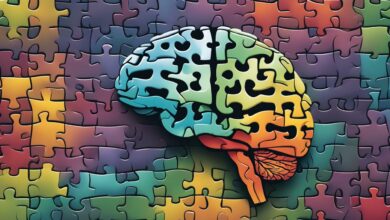Understanding the Dangers of an Unhealthy ENTP Personality

Unhealthy ENTP Personality: An ENTP personality type is known for its ingenuity, independence, and spontaneity. However, when an ENTP personality becomes unhealthy, it can lead to self-destructive tendencies and emotional instability.
In order to address and improve these conditions, it is important to understand personality disorders and mental health issues. This section will provide a brief overview of what an ENTP personality type is and why it can lead to unhealthy behaviors or patterns.
Key Takeaways:
- Understanding personality disorders and mental health issues is crucial in addressing and improving an unhealthy ENTP personality.
- An ENTP personality can become unhealthy and lead to self-destructive tendencies and emotional instability.
Signs of an Unhealthy ENTP Personality
An unhealthy ENTP personality can manifest in several self-destructive tendencies and emotional instability. Identifying these signs is crucial in addressing and rectifying negative behaviors before they escalate into more severe mental health issues. Here are some common signs that an individual with an ENTP personality may be struggling:
| Signs of an Unhealthy ENTP Personality | Description |
|---|---|
| Excessive risk-taking | ENTP personalities are known for their love of taking risks, but this trait can become detrimental when it leads to impulsive and dangerous actions. |
| Lack of empathy | ENTPs are generally analytical individuals, but an unhealthy ENTP may lack the ability to empathize with others, leading to strained relationships and isolation. |
| Emotional volatility | ENTPs may struggle with regulating their emotions, leading to mood swings and intense reactions to situations. |
| Addictive behaviors | An unhealthy ENTP may turn to addictive substances or behaviors as a coping mechanism, such as drugs, alcohol, or excessive gaming. |
| Difficulty with commitments | ENTPs are notorious for their aversion to commitment, but an unhealthy individual may struggle to follow through on promises or obligations, leading to a lack of trust and respect from others. |
Signs of an Unhealthy ENTP Personality
“I always thought my love for taking risks was just part of my personality, but it wasn’t until I started making reckless decisions that I realized it was a problem.”
Recognizing these signs in oneself or others is the first step in addressing an unhealthy ENTP personality. It’s essential to seek help from a mental health professional or follow other appropriate self-help strategies to overcome these tendencies before they lead to more severe issues.
Root Causes of an Unhealthy ENTP Personality
An unhealthy ENTP personality can stem from a variety of root causes. One significant factor is a lack of self-care. ENTPs are known for their enthusiasm for new experiences and ideas, which can lead to neglecting their physical and emotional well-being. Failing to prioritize proper sleep, nutrition, exercise, and rest can result in increased stress levels and compromised immune systems. Over time, this can manifest as chronic illness or exacerbate existing mental health conditions.
Another contributing factor is difficulties in stress management. ENTPs tend to be high achievers and perfectionists, which can result in overwhelming pressure to succeed. This can lead to chronic stress, anxiety, and burnout. Furthermore, ENTPs may have difficulty managing their emotions, as they are not naturally attuned to their own feelings. This can result in bottling up emotions and avoiding confrontations, which may be detrimental to their mental health.
External pressures can also impact an ENTP’s well-being. They may feel the need to constantly prove themselves in their personal and professional lives, leading to unhealthy levels of competition and comparison. Additionally, toxic relationships with colleagues, family, or romantic partners can contribute to the development of an unhealthy ENTP personality. Manipulation, gaslighting, and other forms of emotional abuse can erode an ENTP’s sense of self and lead to even more self-destructive behaviors.
Unhealthy Behavior Patterns in ENTP Personalities
Individuals with an unhealthy ENTP personality may exhibit a range of negative behavior patterns that can impact their relationships, mental health, and overall well-being. These behaviors are often coping mechanisms that have developed as a result of underlying root causes, such as a lack of self-care or difficulties in stress management.
Excessive Risk-Taking: Unhealthy ENTP individuals may engage in risky behaviors without considering the consequences. This can include substance abuse, reckless driving, or impulsive spending habits. They may also engage in risky or dangerous activities as a form of self-soothing or distraction from underlying emotional pain.
Avoidance: Unhealthy ENTP individuals may avoid or repress emotional expression, using humor or sarcasm to deflect from their feelings. This can lead to difficulties in communication and intimacy with others, as well as a lack of self-awareness and emotional intelligence.
Toxic Relationships: Unhealthy ENTP individuals may gravitate towards toxic relationships or engage in patterns of codependency. They may struggle to set boundaries or recognize when their relationships are becoming harmful to their well-being.
Self-Doubt: Unhealthy ENTP individuals may struggle with feelings of inadequacy or imposter syndrome. They may constantly seek validation from others or engage in self-sabotaging behaviors out of fear of failure.
Overcoming Unhealthy Behavior Patterns
It is possible for individuals with an unhealthy ENTP personality to overcome these negative behavior patterns and develop healthier coping mechanisms. This process often requires self-reflection, professional help, and a commitment to personal growth.
- Engage in self-reflection and identify areas where negative patterns may be present.
- Seek professional help from mental health professionals or counselors.
- Develop healthy coping mechanisms, such as practicing mindfulness or engaging in creative activities.
- Set boundaries in relationships and prioritize self-care.
While overcoming unhealthy behavior patterns can be challenging, it is possible with time and effort. Taking steps towards personal growth and well-being is a worthwhile investment in one’s own happiness and quality of life.
Strategies for Improving an Unhealthy ENTP Personality
Individuals with an unhealthy ENTP personality can take specific steps to improve their well-being and overall mental health. The following strategies can help:
- Practice self-reflection: It’s essential to take time to reflect on one’s thoughts, feelings, and behaviors. Self-reflection can help individuals identify their triggers and emotional responses, as well as recognize patterns of behavior that lead to negative outcomes.
- Develop healthy coping mechanisms: ENTP individuals can benefit from learning healthy ways to cope with stress and emotional distress. Healthy coping mechanisms, such as exercise, meditation, and creative expression, can help individuals manage their emotions and improve their overall well-being.
- Seek professional help: Seeking guidance from mental health professionals, such as therapists or counselors, can be an effective way to address and manage personality disorders and mental health issues. A qualified professional can help individuals develop personalized strategies for coping with their unique challenges and work toward improved mental health.
- Practice self-care: Prioritizing self-care, such as getting enough sleep, eating healthy foods, and engaging in enjoyable activities, can help individuals feel more balanced and resilient. Self-care is essential for maintaining good mental health and reducing the risk of burnout.
- Engage in personal growth: ENTP individuals can benefit from setting goals for personal growth and development. This may involve learning new skills, exploring new interests, or taking on new challenges. Personal growth can help individuals develop a sense of purpose and direction, leading to improved mental health and overall well-being.
By incorporating these strategies into their daily lives, individuals with an unhealthy ENTP personality can take steps toward a healthier, more fulfilling life. It’s essential to recognize that change takes time and effort, but with perseverance and support, it is possible to overcome unhealthy tendencies and develop a more positive outlook on life.
Seeking Professional Help for an Unhealthy ENTP Personality
While self-improvement strategies can be helpful, seeking professional help is often necessary for individuals with an unhealthy ENTP personality. Mental health professionals have extensive training in identifying and treating personality disorders and can provide personalized guidance to support an individual’s journey towards better mental health.
Therapy or counseling can be particularly effective in addressing the root causes of an unhealthy ENTP personality. A trained therapist can help an individual identify negative patterns of thinking and behavior, while also providing tools to manage stress and develop healthy coping mechanisms.
There are several different therapeutic approaches that may be helpful for individuals with an unhealthy ENTP personality, including cognitive-behavioral therapy, psychodynamic therapy, and dialectical behavior therapy. Each approach has its own strengths and can be tailored to the unique needs of the individual.
It’s important to do your research and find a mental health professional who is experienced in treating personality disorders and has a deep understanding of the ENTP personality type. There are many resources available to help individuals find qualified therapists, such as online directories and referrals from primary care physicians or other healthcare providers.
Remember, seeking professional help is a sign of strength, not weakness. With the support of a trained therapist, individuals with an unhealthy ENTP personality can overcome their challenges and achieve greater well-being and personal growth.
Conclusion
Recognizing and addressing an unhealthy ENTP personality is crucial for one’s well-being and overall mental health. It is important to understand the signs of an unhealthy ENTP personality, such as self-destructive tendencies and emotional instability, as well as the root causes of these behaviors, including a lack of self-care and difficulties in stress management.
Unhealthy behavior patterns, such as toxic relationships and harmful coping mechanisms, can also perpetuate negative behaviors. However, individuals with an unhealthy ENTP personality can take actionable steps towards self-improvement and personal growth, including seeking professional help and developing healthy coping mechanisms.
Seeking Professional Help
Therapy or counseling can play a pivotal role in managing personality disorders and mental health issues. Qualified mental health professionals can offer guidance and support in addressing an unhealthy ENTP personality. It is important to consider different therapeutic approaches and find a professional that one feels comfortable with.
Overall, recognizing and addressing an unhealthy ENTP personality can lead to a more fulfilling and healthier life. By taking actionable steps towards self-improvement and seeking professional help when necessary, individuals can overcome their negative tendencies and lead a more positive and fulfilling life.
FAQ
Q: What is an unhealthy ENTP personality?
A: An unhealthy ENTP personality refers to the negative behaviors and patterns exhibited by individuals with an ENTP personality type. It can include self-destructive tendencies, emotional instability, and unhealthy coping mechanisms.
Q: How can I recognize signs of an unhealthy ENTP personality?
A: Signs of an unhealthy ENTP personality may include excessive risk-taking, avoidance of emotional expression, and difficulties in managing stress. They may also exhibit unstable relationships and a lack of self-care.
Q: What are the root causes of an unhealthy ENTP personality?
A: The root causes of an unhealthy ENTP personality can stem from a lack of self-care, difficulties in stress management, and the impact of external pressures. These factors may contribute to the development of unhealthy behaviors.
Q: What are some common unhealthy behavior patterns in ENTP personalities?
A: Unhealthy behavior patterns in ENTP personalities can include excessive risk-taking, avoidance of emotional expression, and a tendency to engage in toxic relationships. These patterns may perpetuate negative behaviors and hinder personal growth.
Q: How can I improve an unhealthy ENTP personality?
A: Strategies for improving an unhealthy ENTP personality include self-reflection, seeking professional help, and developing healthy coping mechanisms. It is important to prioritize personal growth and take proactive steps towards positive change.
Q: Should I seek professional help for an unhealthy ENTP personality?
A: Yes, seeking professional help is highly recommended for individuals with an unhealthy ENTP personality. Therapy or counseling can provide valuable support in addressing and managing personality disorders and mental health issues.
Q: What is the importance of recognizing and addressing an unhealthy ENTP personality?
A: Recognizing and addressing an unhealthy ENTP personality is crucial for one’s overall well-being and mental health. By acknowledging and working on unhealthy behaviors, individuals can strive for personal growth, improved relationships, and a more fulfilling life.




